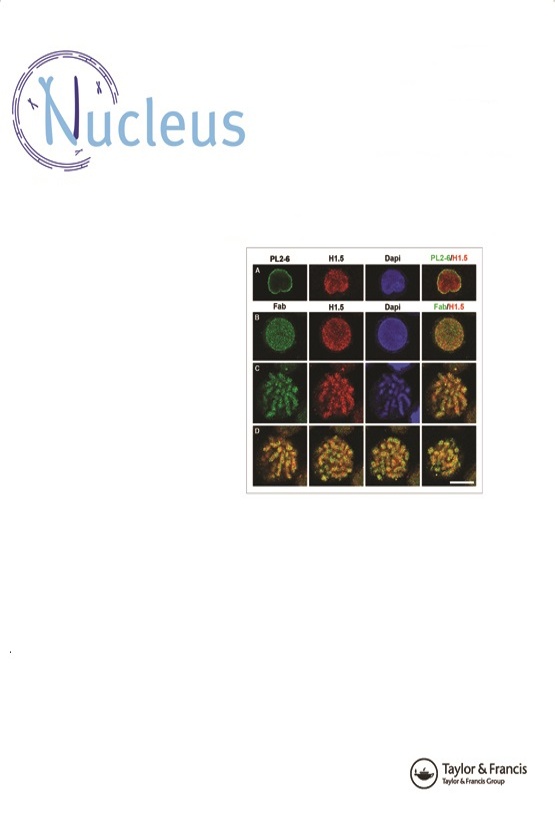Submit a Manuscript to the Journal
Nucleus
For an Article Collection on
Nuclear Mechanobiology
Manuscript deadline
31 August 2024


Article collection guest advisor(s)
Dr. Gunes Uzer,
Boise State University, USA
[email protected]
Nuclear Mechanobiology
Cellular responses rely on effective sensing and intra-cellular transduction of environmental information. This information is either coded in the extracellular matrix as biochemical cues or activated by mechanosensitive signaling cascades through dynamic environmental force gradients. The nucleus, a mechanically-integrated mechanosignaling center, utilizes both direct mechanical input as well as its molecular transducers to sense external stimuli. Fueled by the state-of-the-art molecular, computational and experimental approaches, we are beginning to understand how nucleus structure and connectivity can serve as a mechanosensory element in cells. Cytoskeletal and externally applied forces in turn, initiate mechanosignaling and restructuring events at the nuclear envelope and nucleoskeleton via utilizing chromatin and actin toolboxes. In this way, nuclear mechanotransduction events provide a framework by which chromatin is organized during development, disease and regeneration.
The nuclear envelope, nucleoskeleton and nuclear actin are emerging as critical signaling elements that dynamically regulate how physical information from the extracellular matrix is transduced into the nucleus, affecting nuclear mechanics, conformational changes in nuclear lamina, chromatin organization, DNA repair. Furthermore, mechanotransduction or structural disorders observed in diseases such as cancer, Emery-Dreifuss muscular dystrophies and progeria correlate with mutations in nuclear mechanobiology elements including but not limited to and chromatin dynamics are less understood. Therefore, careful, multidisciplinary studies of extra-nuclear and intra-nuclear mechanotransduction events are needed to shed light into this emerging field of investigation.
A more complete understanding of nuclear organization, signaling, mechanics and chromatin dynamics cannot be gained without uncovering the role mechanical forces play in these processes. This Article Collection welcomes Original Research, Short Reports, and Review manuscripts focused on characterizing and defining roles of mechanical forces in regulation of nuclear mechanotransduction events. In addition, Method manuscripts aimed at quantifying the mechanical forces and understanding the interactions and functions mechanical forces within the nuclear environment are within the scope of the call. This Article Collection aims to bring together multidisciplinary studies to understand how mechanical forces regulate nuclear function.
Dr. Gunes Uzer is an Associate Professor in the Department of Mechanical and Biomedical Engineering at Boise State University. He is the director of the Mechanical Adaptations Laboratory leading a multidisciplinary research program.
Disclosure Statement: Dr. Gunes Uzer has no conflict of interest to disclose regarding this work.
All manuscripts submitted to this Article Collection will undergo desk assessment and peer-review as part of our standard editorial process. Guest Advisors will not be involved in peer-reviewing manuscripts unless they are an existing member of the Editorial Board.
Please review the journal scope and author submission instructions prior to submitting a manuscript.
The deadline for submitting manuscripts is 31st August 2024.
Please contact Menghan Li at [email protected] with any queries regarding this Article Collection.
Benefits of publishing open access within Taylor & Francis
Global marketing and publicity, ensuring your research reaches the people you want it to.
Article Collections bring together the latest research on hot topics from influential researchers across the globe.
Rigorous peer review for every open access article.
Rapid online publication allowing you to share your work quickly.
Looking to Publish your Research?
Find out how to publish your research open access with Taylor & Francis Group.
Choose open accessSubmission Instructions
All manuscripts submitted to this Article Collection will undergo desk assessment and peer-review as part of our standard editorial process. Guest Advisors for this collection will not be involved in peer-reviewing manuscripts unless they are an existing member of the Editorial Board. Please review the journal Aims and Scope and author submission instructions prior to submitting a manuscript.